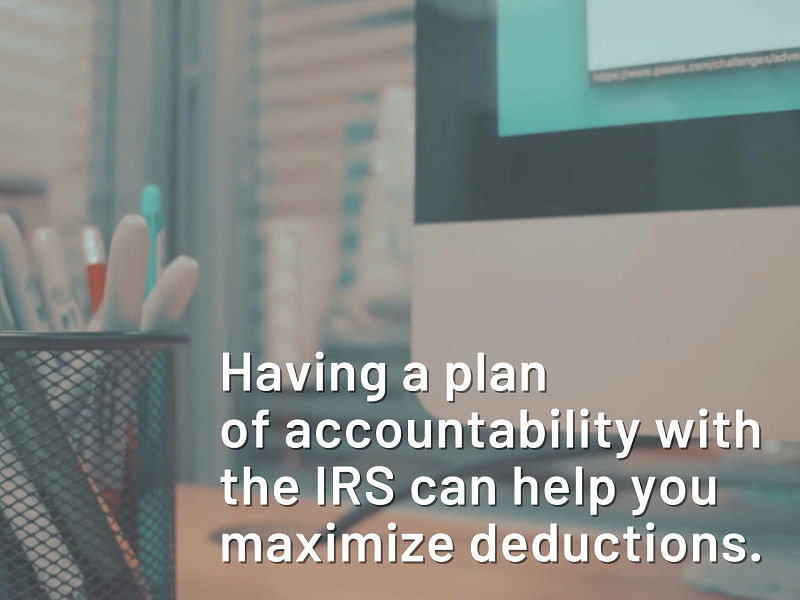Using an IRS Accountable Plan to Maximize Deductions for Your San Francisco Bay Area Business

Any of you San Francisco Bay Area business owners remember those halcyon days when you could "talk a little business" with somebody while traveling ... and then you got to write off the whole getaway on your taxes?
Even if that ever really happened, that ain’t today. Now, the good folks at the IRS pull against their leashes to get at businesspeople who try to finagle an on-the-job tax deduction – and the taxman’s very best friend can be your own sloppy records.
Get yourself an “IRS accountable plan.” (Ahem.)
Patti (408) 241-4100 Gale 408-775-7800
And before I dive into all that, one more reminder that this Friday, October 15th is the deadline for extended federal personal tax returns for 2020 (for the vast majority of the country).
If you need a quick chat on this, use the info above and get in touch.
In the meantime, let's get your books "on lock" as the young people say.
(Do they still say that?)
Using an IRS Accountable Plan to Maximize Deductions for Your San Francisco Bay Area Business
“It is time to restore the American precept that each individual is accountable for his actions.” - Ronald Reagan
“IRS accountable plan” is a fancy way of saying “Reimbursing your employees -- and yourself -- without making the taxman mad.”
You and your employees often reach into your own pockets for legit business expenses – sometimes for just a couple of bucks but sometimes for a lot more. Used to be if you had enough of these expenses, you could deduct them on your personal tax return.
Then came the Tax Cuts and Jobs Act of 2017. Maybe you heard about it? Well, it pretty much erased the regular taxpayer’s itemized deductions for business.
But what happens if you still need copy paper or to drive your car to see a client (or for that matter, call a client on your personal cell phone)? Do you just have to eat that cost?
IRS accountable plans are formal guidelines that you create, which explain how you reimburse your employees for expenses and which ones qualify for reimbursement. (Reimbursements for expenses aren’t wages, so they’re not subject to tax.)
Sound good? Can be – but it takes work.
The deduction is in the details
You won’t have to submit your accountable plan to the IRS but, if you want your deductions to hold up to scrutiny (yes, that scary word: “audit”), it’s a good idea to know what your accountant plan should include.
(By the way, we’re going to talk more here about the plan itself than about the deductions themselves.)
First, your “IRS accountable plan” doesn’t have to be written – but why shouldn’t it be? It makes everything clear to everybody in your company – and the IRS respects paper.
Your plan should cover how much time your employees have to submit expenses; how they ask for reimbursement, including what documents are needed; what you’ll reimburse them for; the max that you’ll reimburse; and when employees should give back leftover reimbursement money.
The IRS likes it if your plan also makes crystal clear how the expenses relate to your business. They also have to be substantiated in what’s called “a reasonable period” and your employee has to give back any expenses money they don’t spend in, again, “a reasonable period.”
The IRS does seem to think that 30, 60 or 120 days is “reasonable” depending on whether it’s for your employee submitting expenses, you paying them, or your employees paying back excess.
Some San Mateo biz owners might wonder, “What about small stuff like tips? I need records for that?” Well, the IRS is a little cagey on what they think “small” is. Some biz owners probably think records for anything more than ten bucks is a good idea. Others probably say five.
Don’t guess. Keep everything, take no chances, and just document, baby, document.
Go for the record
Sure, they’re a pain to keep, but detailed records strengthen your case. There’s just no way around that. Keep them with your IRS accountable plan. Get yourself a designated logbook (hey, that’s an expense, too) and keep receipts, bills, and credit card statements. Photocopies will work.
Detail detail detail those expenses: amount, time, place, and reason for the spending. “Twenty bucks for gas” doesn’t fly like “Twenty bucks for gas for this employee, on this day and time, at this gas station, because my employee was headed here to meet this person and here’s exactly how the whole relates to my business.”
More pointers:
- If it’s a lump-sum bill, staple on a detailed breakdown of what expenses it covers.
- Even if you use the standard IRS mileage rate for employees’ car use, employees still have to report other elements of business driving to you. Get as many details in writing as possible – there’s just no substitute.
- Prorate per-diem rates for partial days of business activity for your employees.
Check with us if you have any questions … and keep every scrap of paper for records (and keep it organized if you can). You’ll be glad you did.
If you need help formulating this ... well, that's what we're here for.
Patti (408) 241-4100 Gale 408-775-7800
To more of your business's money trickling into the bottom line,
Patti ONeill and Gale Bergado
(408) 241-4100
ONeill & Bergado